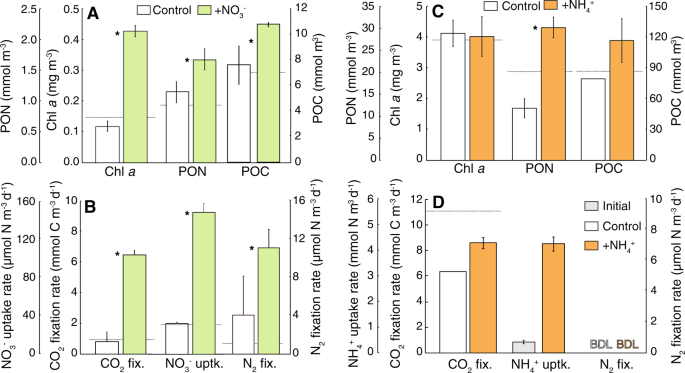
Moore CM, Mills MM, Arrigo KR, Berman-Frank I, Bopp L, Boyd PW, et al. Processes and patterns of oceanic nutrient limitation. Nat Geosci. 2013;6:701–10.
Zehr JP, Ward BB. Nitrogen cycling in the ocean: new perspectives on processes and paradigms. Appl Environ Microbiol. 2002;68:1015–24.
Capone D, Zehr J, Paerl H, Bergman B. Trichodesmium, a globally significant marine cyanobacterium. Science. 1997;276:1221–9.
Villareal TA. Widespread occurrence of the hemiaulus-cyanobacterial symbiosis in the southwest North-Atlantic Ocean. Bull Mar Sci. 1994;54:1–7.
Zehr JP, Mellon MT, Zani S. New nitrogen fixing microorganisms detected in oligotrophic oceans by the amplification of nitrogenase (nifH) genes. Appl Environ Microbiol. 1998;64:3444–50.
Thompson A, Carter BJ, Turk-Kubo K, Malfatti F, Azam F, Zehr JP. Genetic diversity of the unicellular nitrogen-fixing cyanobacteria UCYN-A and its prymnesiophyte host. Environ Microbiol. 2014;16:3238–49.
Thompson AW, Foster RA, Krupke A, Carter BJ, Musat N, Vaulot D, et al. Unicellular cyanobacterium symbiotic with a single-celled eukaryotic alga. Science. 2012;337:1546–50.
Tripp HJ, Bench SR, Turk KA, Foster RA, Desany BA, Niazi F, et al. Metabolic streamlining in an open-ocean nitrogen-fixing cyanobacterium. Nature. 2010;464:90–94.
Bombar D, Heller P, Sanchez-Baracaldo P, Carter BJ, Zehr JP. Comparative genomics reveals surprising divergence of two closely related strains of uncultivated UCYN-A cyanobacteria. ISME J. 2014;8:2530–42.
Cornejo-Castillo FM, Munoz-Marin MDC, Turk-Kubo KA, Royo-Llonch M, Farnelid H, Acinas SG, et al. UCYN-A3, a newly characterized open ocean sublineage of the symbiotic N2 -fixing cyanobacterium candidatus Atelocyanobacterium thalassa. Environ Microbiol. 2019;21:111–24.
Martinez-Perez C, Mohr W, Loscher CR, Dekaezemacker J, Littmann S, Yilmaz P, et al. The small unicellular diazotrophic symbiont, UCYN-A, is a key player in the marine nitrogen cycle. Nat Microbiol. 2016;1:16163.
Postgate J. The origins of the unit of nitrogen fixation at the University of Sussex. Notes Rec R Soc. 1998;52:355–62.
Knapp AN. The sensitivity of marine N2 fixation to dissolved inorganic nitrogen. Front Microbiol. 2012;3:374.
Holl CM, Montoya JP. Interactions between nitrate uptake and nitrogen fixation in continuous cultures of the marine diazotroph, Trichodesmium (cyanobacteria). J Phycol. 2005;41:1178–83.
Mulholland MR, Capone DG. Nitrogen fixation, uptake, and metabolism in natural and cultured populations of Trichodesmium spp. Mar Ecol Prog Ser. 1999;188:33–49.
Ohki K, Zehr JP, Falkowski PG, Fujita Y. Regulation of nitrogen-fixation by different nitrogen-sources in the marine nonheterocystous cyanobacterium Trichodesmium Sp Nibb1067. Arch Microbiol. 1991;156:335–7.
Dekaezemacker J, Bonnet S. Sensitivity of N2 fixation to combined nitrogen forms (({rm{NO}}_{3}^{-}) and ({rm{NH}}_{4}^{+})) in two strains of the marine diazotroph Crocosphaera watsonii (cyanobacteria). Mar Ecol Prog Ser. 2011;438:33–46.
Garcia NS, Hutchins DA. Light-limited growth rate modulates nitrate inhibition of dinitrogen fixation in the marine unicellular cyanobacterium Crocosphaera watsonii. PLoS ONE. 2014;9:e114465.
Großkopf T, Laroche J. Direct and indirect costs of dinitrogen fixation in Crocosphaera watsonii WH8501 and possible implications for the nitrogen cycle. Front Microbiol. 2012;3:236.
Bentzon-Tilia M, Traving SJ, Mantikci M, Knudsen-Leerbeck H, Hansen JLS, Markager S, et al. Significant N2 fixation by heterotrophs, photoheterotrophs and heterocystous cyanobacteria in two temperate estuaries. ISME J. 2015;9:273–85.
Shiozaki T, Fujiwara A, Ijichi M, Harada N, Nishino S, Nishi S, et al. Diazotroph community structure and the role of nitrogen fixation in the nitrogen cycle in the Chukchi Sea (western Arctic Ocean). Limnol Oceanogr. 2018;63:2191–205.
Mulholland MR, Bernhardt PW, Blanco-Garcia JL, Mannino A, Hyde K, Mondragon E. et al. Rates of dinitrogen fixation and the abundance of diazotrophs in North American coastal waters between Cape Hatteras and Georges Bank. Limnol Oceanogr. 2012;57:1067–83.
Mulholland MR, Bernhardt P, Widner B, Selden C, Chappell P, Clayton S, et al. High rates of N2 fixation in temperate, western North Atlantic coastal waters expand the realm of marine diazotrophy. Glob Biogeochem Cy. 2019;33:826–40.
Moreira-Coello V, Mouriño-Carballido B, Marañón E, Fernández-Carrera A, Bode A, Varela MM. Biological N2 fixation in the upwelling region off NW Iberia: magnitude, relevance, and players. Front Mar Sci. 2017;4:303.
Turk-Kubo KA, Connell PE, Caron DA, Hogan ME, Farnelid HM, Zehr JP. In situ diazotroph population dynamics under different resource ratios in the North Pacific Subtropical Gyre. Front Microbiol. 2018;9:1616.
Krupke A, Mohr W, LaRoche J, Fuchs BM, Amann RI, Kuypers MM. The effect of nutrients on carbon and nitrogen fixation by the UCYN-A-haptophyte symbiosis. ISME J. 2015;9:1635–47.
Cabello AM, Cornejo-Castillo FM, Raho N, Blasco D, Vidal M, Audic S, et al. Global distribution and vertical patterns of a prymnesiophyte-cyanobacteria obligate symbiosis. ISME J. 2016;10:693–706.
Cornejo-Castillo FM, Cabello AM, Salazar G, Sanchez-Baracaldo P, Lima-Mendez G, Hingamp P, et al. Cyanobacterial symbionts diverged in the late Cretaceous towards lineage-specific nitrogen fixation factories in single-celled phytoplankton. Nat Commun. 2016;7:11071.
Glibert PM and Capone DG. Mineralization and assimilation in aquatic, sediment, and wetland systems. In: Knowles R, Blackburn TH, editors. ‘Nitrogen Isotope Techniques’. San Diego, CA: Academic Press; 1993, p. 243–72.
Grasshoff K, Kremling K, Ehrhardt M, (eds). Methods of Seawater Analysis. Weinheim: Wiley-VCH; 1999. p. 600.
Holm-Hansen O, Lorenzen CJ, Holmes RW, Strickland JD. Fluorometric determination of chlorophyll. ICES J Mar Sci. 1965;30:3–15.
Mohr W, Großkopf T, Wallace DW, LaRoche J. Methodological underestimation of oceanic nitrogen fixation rates. PLoS ONE. 2010;5:e12583.
Wilson ST, Böttjer D, Church MJ, Karl DM. Comparative assessment of nitrogen fixation methodologies, conducted in the oligotrophic North Pacific Ocean. Appl Environ Microbiol. 2012;78:6516–23.
Böttjer D, Dore JE, Karl DM, Letelier RM, Mahaffey C, Wilson ST, et al. Temporal variability of nitrogen fixation and particulate nitrogen export at Station ALOHA. Limnol Oceanogr. 2017;62:200–16.
Gradoville MR, Bombar D, Crump BC, Letelier RM, Zehr JP, White AE. Diversity and activity of nitrogen‐fixing communities across ocean basins. Limnol Oceanogr. 2017;62:1895–909.
Hernandez-de-la-Torre B, Gaxiola-Castro G, Alvarez-Borrego S, Gomez-Valdes J, Najera-Martinez S. Interannual variability of new production in the southern region of the California Current. Deep Sea Res Part Ii-Topical Stud Oceanogr. 2003;50:2423–30.
Bronk D, Ward B. Inorganic and organic nitrogen cycling in the Southern California Bight. Deep Sea Res Part I. 2005;52:2285–300.
Sigman DM, Karsh KL, Casciotti K Nitrogen isotopes in the ocean, in Encyclopedia of Ocean Sciences, 2nd ed., J. H. Steele et al., editors. London: Academic; 2009. p. 40–54. https://doi.org/10.1016/B978-012374473-9.00632-9.
Polerecky L, Adam B, Milucka J, Musat N, Vagner T, Kuypers MM. Look@ NanoSIMS—a tool for the analysis of nanoSIMS data in environmental microbiology. Environ Microbiol. 2012;14:1009–23.
Kana TM, Darkangelo C, Hunt MD, Oldham JB, Bennett GE, Cornwell JC. Membrane inlet mass spectrometer for rapid high-precision determination of N2, O2, and Ar in environmental water samples. Analytical Chemistry. 1994;66:4166–70.
Montoya JP, Voss M, Kahler P, Capone DG. A simple, high-precision, high-sensitivity tracer assay for N2 fixation. Appl Environ Microbiol. 1996;62:986–93.
Villareal TA. Laboratory culture and preliminary characterization of the nitrogen-fixing Rhizosolenia–Richelia symbiosis. Mar Ecol. 1990;11:117–32.
Adam B, Klawonn I, Svedén JB, Bergkvist J, Nahar N, Walve J, et al. N2-fixation, ammonium release and N-transfer to the microbial and classical food web within a plankton community. ISME J. 2016;10:450.
Dortch Q, Clayton JR, Thoresen SS, Ahmed SI. Species-differences in accumulation of nitrogen pools in phytoplankton. Mar Biol. 1984;81:237–50.
Bruhn A, LaRoche J, Richardson K. Emiliania Huxleyi (Prymnesiophyceae): nitrogen-metabolism genes and their expression in response to external nitrogen sources. J Phycol. 2010;46:266–77.
Lindehoff E, Graneli E, Gilbert PM. Nitrogen uptake kinetics of Prymnesium parvum (Haptophyte). Harmful Algae. 2011;12:70–76.
Wehr JD, Brown LM, O’Grady K. Highly specialized nitrogen metabolism in a freshwater phytoplankter, Chrysochromulina breviturrita. Can J Fish Aquat Sci. 1987;44:736–42.
Lie AA, Liu Z, Terrado R, Tatters AO, Heidelberg KB, Caron DA. Effect of light and prey availability on gene expression of the mixotrophic chrysophyte, Ochromonas sp. BMC Genomics. 2017;18:163.
Terrado R, Monier A, Edgar R, Lovejoy C. Diversity of nitrogen assimilation pathways among microbial photosynthetic eukaryotes. J Phycol. 2015;51:490–506.
Falkowski P. Enzymology of nitrogen assimilation. In: Carpenter EJ, Capone DG, ed. Nitrogen in the Marine Environment. NY: Academic Press; 1983.
Inomura K, Bragg J, Follows MJ. A quantitative analysis of the direct and indirect costs of nitrogen fixation: a model based on Azotobacter vinelandii. ISME J. 2017;11:166–75.
McKew BA, Metodieva G, Raines CA, Metodiev MV, Geider RJ. Acclimation of Emiliania huxleyi (1516) to nutrient limitation involves precise modification of the proteome to scavenge alternative sources of N and P. Environ Microbiol. 2015;17:4050–62.
Palenik B, Henson SE. The use of amides and other organic nitrogen sources by the phytoplankton Emiliania huxleyi. Limnol Oceanogr. 1997;42:1544–51.
Dahl E, Bagøien E, Edvardsen B, Stenseth NC. The dynamics of Chrysochromulina species in the Skagerrak in relation to environmental conditions. J Sea Res. 2005;54:15–24.
Tillmann U. Phagotrophy by a plastidic haptophyte, Prymnesium patelliferum. Aquat Micro Ecol. 1998;14:155–60.
Chan Y-F, Chiang K-P, Ku Y, Gong G-C. Abiotic and biotic factors affecting the ingestion rates of mixotrophic nanoflagellates (Haptophyta). Micro Ecol. 2019;77:607–15.
Unrein F, Gasol JM, Not F, Forn I, Massana R. Mixotrophic haptophytes are key bacterial grazers in oligotrophic coastal waters. ISME J. 2014;8:164.
Frias‐Lopez J, Thompson A, Waldbauer J, Chisholm SW. Use of stable isotope‐labelled cells to identify active grazers of picocyanobacteria in ocean surface waters. Environ Microbiol. 2009;11:512–25.
Biddanda B, Benner R. Carbon, nitrogen, and carbohydrate fluxes during the production of particulate and dissolved organic matter by marine phytoplankton. Limnol Oceanogr. 1997;42:506–18.
Carlucci A, Bowes PM. Production of vitamin b12, thiamine, and biotin by phytoplankton 1. J Phycol. 1970;6:351–57.
Gledhill M, Buck KN. The organic complexation of iron in the marine environment: a review. Front Microbiol. 2012;3:69.
Smail, E. B-vitamins and trace metals in the Pacific Ocean: Ambient distribution and biological impacts. Los Angeles, California, USA: USC Digital Library, University of Southern California, University Park Campus MC 7002, 106 University Village; 2012.
Benavides M, Martias C, Elifantz H, Berman-Frank I, Dupouy C, Bonnet S. Dissolved organic matter influences N2 fixation in the New Caledonian lagoon (Western Tropical South Pacific). Front Mar Sci. 2018;5:89.
Benavides M, Duhamel S, Van Wambeke F, Shoemaker KM, Moisander PH, Salamon E, et al. Dissolved organic matter stimulates N2 fixation and nifH gene expression in Trichodesmium. FEMS Microbiol Lett. 2020;367:fnaa034.
Nef C, Jung S, Mairet F, Kaas R, Grizeau D, Garnier M. How haptophytes microalgae mitigate vitamin B 12 limitation. Sci Rep.-Uk. 2019;9:1–11.
Wang WL, Moore JK, Martiny AC, Primeau FW. Convergent estimates of marine nitrogen fixation. Nature. 2019;566:205–11.
Ward BA, Dutkiewicz S, Moore CM, Follows MJ. Iron, phosphorus, and nitrogen supply ratios define the biogeography of nitrogen fixation. Limnol Oceanogr. 2013;58:2059–75.
Fonseca-Batista D, Li X, Riou V, Michotey V, Deman F, Fripiat F, et al. Evidence of high N2 fixation rates in the temperate northeast Atlantic. Biogeosciences. 2019;16:999–1017.
Harding K, Turk-Kubo KA, Sipler RE, Mills MM, Bronk DA, Zehr JP. Symbiotic unicellular cyanobacteria fix nitrogen in the Arctic Ocean. Proc Natl Acad Sci USA. 2018;115:13371–5.
Tang W, Wang S, Fonseca-Batista D, Dehairs F, Gifford S, Gonzalez AG, et al. Revisiting the distribution of oceanic N2 fixation and estimating diazotrophic contribution to marine production. Nat Commun. 2019;10:831.
Source: Ecology - nature.com



